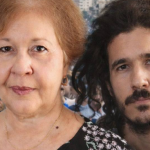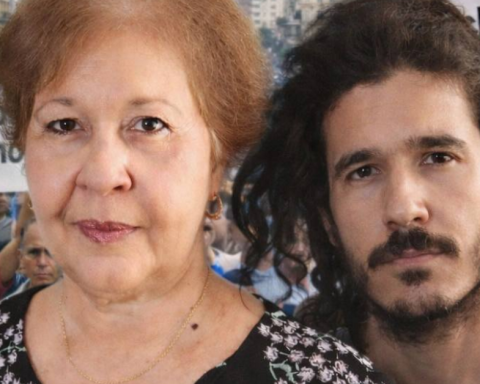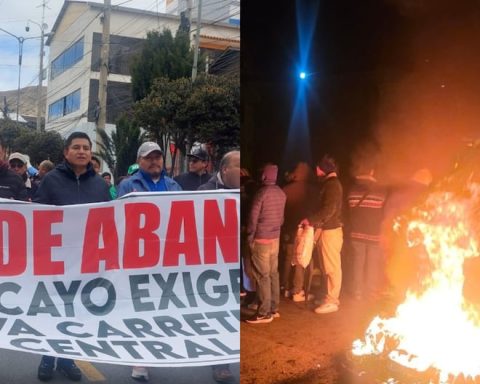Losing a child who is on the way is painful. Always traumatic. And that trauma is multiplied untold when the affected woman, instead of receiving support, is criminalized. This is what many women have suffered from The Saviorone of the countries with the most restrictive abortion laws in the world, where even an obstetric emergency can lead to a 30-year sentence, like the one handed down on May 9 against Esme. She thus identifies her, to protect her identity. She is currently on parole, but she has already spent two years in prison, after having suffered an untimely delivery in 2019, in a rural area.
When Esme went to the hospital for medical attention, she was reported. They said “that she had aborted and had ended the life of the newborn, without knowing more in depth what caused the birth or that she could not go for help “, tells DW his lawyer, Karla Vaquerano, who is waiting to receive the sentence in writing on May 24 to appeal. She affirms that the judge based her decision solely on the arguments of the Prosecutor’s Office, without taking into account what was raised by the defense.
“aggravated homicide”
“We are one of the most violent countries in the world and women in vulnerable conditions continue to be criminalized,” says the lawyer, who is part of the legal team of the Citizen Group for the Decriminalization of Therapeutic, Ethical and Eugenic Abortion (Acdatee).And he explains that many times the processes are initiated by abortion and then the figure is changed to “aggravated homicide”, which can be punished with much higher penalties.
Morena Herrera, president of Acdatee, considers “it is important that people understand that it is not only the abortion law, but also this conception that abortion is murder and, therefore, in a more advanced stage of pregnancy, they elevate it to homicide aggravated by the maternal bond”. In his opinion, “there is a very misogynistic conception of Justice, very much against women, especially poor women”.
criminalization of poverty
Karla Vaquerano stresses that poverty is criminalized. “There is a pattern: they are all women with limited resources, they are women who live in the interior of the country, they are women who are heads of households, they are women who are alone”, explains the lawyer.
But there is also a political aspect, in a country where attempts to reform the abortion law fail. “The governments, this one and the others, do not consider the value of women’s lives. That is the underlying problem. But, in addition, there is a political calculation, I believe that this is very present in the current government, a calculation electoral politician, based on his ties with the churches, with the Catholic Church and with the evangelical churches,” says Morena Herrera.
Esme’s case represents a setback for the work of defenders, especially considering that it is the first conviction of its kind in seven years. But his defenders have also just received some good news. This Wednesday one of the four women who remained in prison for this cause was released from jail. Jaqueline had been sentenced to 15 years, after having an out-of-hospital delivery, despite the fact that her daughter survived. She was accused of having wanted an abortion. With it, the number of those who have regained their freedom thanks to the efforts of the Citizen Group for the Decriminalization of Abortion rises to 65. And the organization reaffirms its will to get them all out of prison.
The verdict of the IACHR
El Salvador already received a conviction in 2021 from the Inter-American Court of Human Rights (IACHR) for the criminalization of Manuela, a woman who died of cancer in prison, where she was being held after having suffered a precipitous delivery. “There is no doubt that Manuela suffered an obstetric emergency caused by preeclampsia. The Court notes that obstetric emergencies, because they are a medical condition, cannot automatically give rise to a criminal sanction,” the IACHR indicated.
Now another case has also come to that court, that of Beatriz, who in 2013 had an anencephalic pregnancy. The doctors recommended interrupting it, but said they could not intervene without judicial authorization. “She then requested an amparo before the Supreme Court of Justice and they made her wait 81 days to perform the hysterectomy procedure,” says Morena Herrera. “We hope that the State of El Salvador will be condemned again for the violation of Beatriz’s right Y in that sentence it is unavoidable that the court has to establish a measure of non-repetition, related to the change in the law”.
She also pins hopes on the change in Salvadoran society, “especially for women and the youngest, who are becoming aware of this problem and are speaking out. These are factors that we consider hopeful, in addition to the fact that a government that modern project, like the current one, cannot continue to maintain these laws and this form of law enforcement”.
Losing a child who is on the way is painful. Always traumatic. And that trauma is multiplied untold when the affected woman, instead of receiving support, is criminalized. This is what many women have suffered from The Saviorone of the countries with the most restrictive abortion laws in the world, where even an obstetric emergency can lead to a 30-year sentence, like the one handed down on May 9 against Esme. She thus identifies her, to protect her identity. She is currently on parole, but she has already spent two years in prison, after having suffered an untimely delivery in 2019, in a rural area.
When Esme went to the hospital for medical attention, she was reported. They said “that she had aborted and had ended the life of the newborn, without knowing more in depth what caused the birth or that she could not go for help “, tells DW his lawyer, Karla Vaquerano, who is waiting to receive the sentence in writing on May 24 to appeal. She affirms that the judge based her decision solely on the arguments of the Prosecutor’s Office, without taking into account what was raised by the defense.
“aggravated homicide”
“We are one of the most violent countries in the world and women in vulnerable conditions continue to be criminalized,” says the lawyer, who is part of the legal team of the Citizen Group for the Decriminalization of Therapeutic, Ethical and Eugenic Abortion (Acdatee).And he explains that many times the processes are initiated by abortion and then the figure is changed to “aggravated homicide”, which can be punished with much higher penalties.
Morena Herrera, president of Acdatee, considers “it is important that people understand that it is not only the abortion law, but also this conception that abortion is murder and, therefore, in a more advanced stage of pregnancy, they elevate it to homicide aggravated by the maternal bond”. In his opinion, “there is a very misogynistic conception of Justice, very much against women, especially poor women”.
criminalization of poverty
Karla Vaquerano stresses that poverty is criminalized. “There is a pattern: they are all women with limited resources, they are women who live in the interior of the country, they are women who are heads of households, they are women who are alone”, explains the lawyer.
But there is also a political aspect, in a country where attempts to reform the abortion law fail. “The governments, this one and the others, do not consider the value of women’s lives. That is the underlying problem. But, in addition, there is a political calculation, I believe that this is very present in the current government, a calculation electoral politician, based on his ties with the churches, with the Catholic Church and with the evangelical churches,” says Morena Herrera.
Esme’s case represents a setback for the work of defenders, especially considering that it is the first conviction of its kind in seven years. But his defenders have also just received some good news. This Wednesday one of the four women who remained in prison for this cause was released from jail. Jaqueline had been sentenced to 15 years, after having an out-of-hospital delivery, despite the fact that her daughter survived. She was accused of having wanted an abortion. With it, the number of those who have regained their freedom thanks to the efforts of the Citizen Group for the Decriminalization of Abortion rises to 65. And the organization reaffirms its will to get them all out of prison.
The verdict of the IACHR
El Salvador already received a conviction in 2021 from the Inter-American Court of Human Rights (IACHR) for the criminalization of Manuela, a woman who died of cancer in prison, where she was being held after having suffered a precipitous delivery. “There is no doubt that Manuela suffered an obstetric emergency caused by preeclampsia. The Court notes that obstetric emergencies, because they are a medical condition, cannot automatically give rise to a criminal sanction,” the IACHR indicated.
Now another case has also come to that court, that of Beatriz, who in 2013 had an anencephalic pregnancy. The doctors recommended interrupting it, but said they could not intervene without judicial authorization. “She then requested an amparo before the Supreme Court of Justice and they made her wait 81 days to perform the hysterectomy procedure,” says Morena Herrera. “We hope that the State of El Salvador will be condemned again for the violation of Beatriz’s right Y in that sentence it is unavoidable that the court has to establish a measure of non-repetition, related to the change in the law”.
She also pins hopes on the change in Salvadoran society, “especially for women and the youngest, who are becoming aware of this problem and are speaking out. These are factors that we consider hopeful, in addition to the fact that a government that modern project, like the current one, cannot continue to maintain these laws and this form of law enforcement”.
;


















